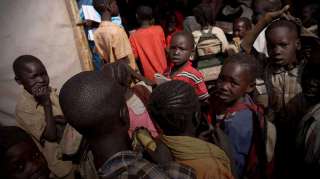Sudanese child refugees enrol in Ethiopian camp school
By Tesfa-Alem Tekle
March 1, 2012 (ADDIS ABABA) – Sudanese child refugees from conflicts in Blue Nile state are receiving primary education at the recently opened Tongo refugee camp in neighbouring Ethiopia.

Togo camp, some 200km away from the main entry point Kumruk, was opened in October 2011 and a month later a makeshift primary school was set up to provide education to the thousands of children aged between five and 17. According to the UN Refugee Agency (UNHCR), currently half of them, some 2,000 children, are able to attend classes at the tent schoolroom.
There is a high demand for education but the supply is so limited and students are made to go to school on shifts to reach as many as possible.
UNHCR says providing for the educational needs for children and young adults is one among the many challenges it is facing at the Ethiopian refugee camp.
The UNHCR is building new classrooms with the capacity to accommodate as many as 800 more children and hopes that a permanent school structure will be established by September 2012.
Registration for new students at the new facility has already begun and UNHCR is constructing latrines and laying the groundwork for water facilities for the students.
Mohammed Ashimi, a tribal chief, is also the headmaster of the primary school. He himself is a refugee in the Tongo camp. He crossed in to Ethiopia when fighting erupted in September 2011.
Ashimi said he often found the students drawing aircraft dropping bombs as it had become such a regular and disturbing event.
He said that in an average class 40 percent of the students have a parent missing and 10 percent are orphans.
Blue Nile is one of three border areas along with South Kordofan and Abyei which has become scene of fighting since South Sudan’s proclaim independence in July 2011.
(ST)
